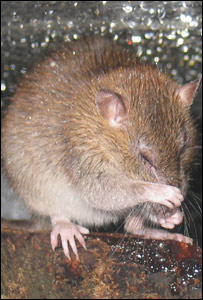My parents are taking a well-earned respite from the cold of Canada and embarked on a cruise from Florida the other day.
 Hopefully it’s better than the one described below.
Hopefully it’s better than the one described below.
A couple from Missouri says their honeymoon cruise was ruined by sewage spewing from a shower drain, leaving them to celebrate amid the smell of “poop” inside their cabin.
Christine Parker and John Shoemaker, of St. Louis, detailed their foul experience in November aboard the Carnival Triumph in an interview with the Miami Herald, claiming unsanitary conditions on the 14-deck, 893-foot mega-ship turned what should have been a celebration into a potential health scare.
“We didn’t have a good honeymoon,” Parker told the newspaper. “People expect you to come back so excited and we have been fighting with the Carnival staff and smelling poop in our room. We were exhausted and angry.”
To make matters even worse, Parker claimed crew members aboard the ship acted as if black sewage reeking of fecal matter was no big deal.
For her troubles, Parker said Carnival offered her a $300 credit to be used on the ship and 15 percent off her next cruise with the company — which she doesn’t intend to book anytime soon.
The ship, which arrived back in south Florida on Nov. 11, was later given a failing grade by inspectors from the Centers for Disease Control and Prevention’s Vessel Sanitation Program.
Two other Carnival Cruise Line ships — the Breeze and the Vista, the company’s newest vessel — failed similar inspections in December, bringing the company’s tally to three failed inspections within two months, according to the Herald.
A Miami-based maritime attorney told the newspaper that failed inspections on cruise ships typically occur roughly two or three times per year, making the rash of poor grades a rarity.
Chabeli Herrera of the Miami Herald reports that aboard the Carnival Vista, Carnival Cruise Line’s newest ship, crew members hid trolleys of potentially hazardous food, equipment and dirty dishware from sanitation inspectors.
Fruit flies were found by the buffet and in a Parmesan cheese container. Crew failed to appropriately document illnesses on board.
On the Carnival Breeze, another of the Doral-based line’s newest vessels, machinery was found to be corroded or not functioning properly. About 25 garbage bins overflowing with waste were found by inspectors near an area where food was handled.
These violations and dozens of others landed both ships failing grades from the Centers for Disease Control and Prevention’s Vessel Sanitation Program, which routinely inspects cruise ships in an effort to control the spread of gastrointestinal illnesses. Ships must score 86 points or higher, out of 100, to pass.
But December’s reports follow another Carnival failure reported in November aboard the Carnival Triumph, bringing Carnival’s tally to three failed inspections in the past two months.

.jpg) Specifically, contact with animals in the "Feed the Animals" exhibit on the third floor children’s area of the exposition center was probably where the outbreak originated, according to the extensive 15-page report.
Specifically, contact with animals in the "Feed the Animals" exhibit on the third floor children’s area of the exposition center was probably where the outbreak originated, according to the extensive 15-page report. And 30 minutes ago after returning from the beach, Sorenne peed on me and the towel she was wrapped in (that’s us, right, watching the sunset in Venice, Florida, last night).
And 30 minutes ago after returning from the beach, Sorenne peed on me and the towel she was wrapped in (that’s us, right, watching the sunset in Venice, Florida, last night)..jpg) So says the
So says the  The saga began in early November when a 19-year-old resident noticed the water was "smelly" and she began feeling ill.
The saga began in early November when a 19-year-old resident noticed the water was "smelly" and she began feeling ill.